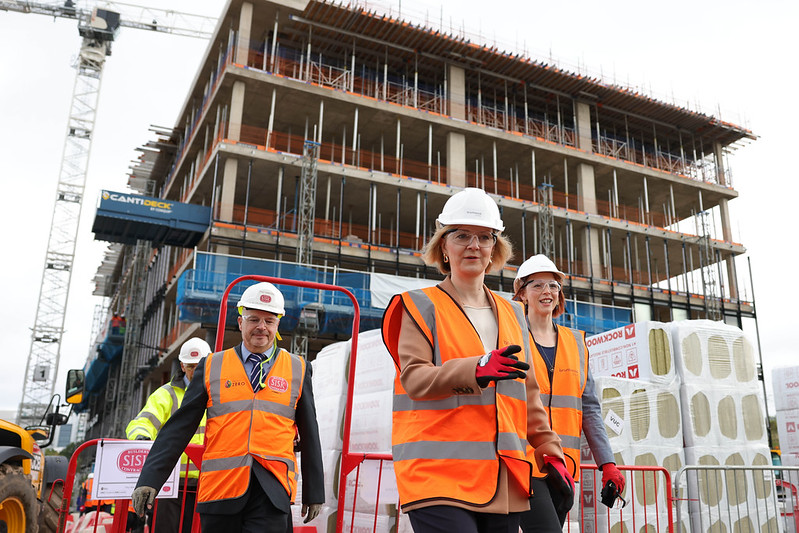Who wanted to cut taxes for highest earners?
Many Conservatives still think idea that caused public backlash made economic sense
Thursday, 6th October 2022 — By Richard Osley in Birmingham

Prime Minister Liz Truss Visits Health Innovation Campus [Conservative Party]
KEY Conservatives still believe it would make economic sense to cut tax for the highest earners, despite the budget backlash which has wrecked the conference season for the party.
Prime minister Liz Truss was already fighting for her future this week in what was supposed to be her honeymoon period and the best autumn of her political career.
Instead, she has faced anger over her financial strategy and capsizing poll ratings, which suggested she is already more unpopular than Boris Johnson at his lowest rank.
Without having to breathe a word this week, Labour Party leader Sir Keir Starmer – the Holborn and St Pancras MP – appeared to be making further steps towards Downing Street.
In a chaotic week and a conference like no other, Ms Truss went from defending a tax cut for the best paid workers in a TV interview and insisting she would not change her mind to then ordering a U-turn on Monday morning.
She removed the cut to the 45p in the pound top rate, with both chancellor Kwasi Kwarteng and herself using the phrase “we get it”. A huge number of “safe” Tory seats would be apparently brought into play if the swing to Labour charted in the polls is maintained, so backbench Conservatives were already said to be readying the horses for a challenge and may have even voted against the strategy.
Despite the change of direction, it was clear in Birmingham this week that there was still those who held strong support for the principle that those who earn the most should be handed a tax cut to attract investment.
At the same time, a bizarre blame game was emerging as to who had come up with the idea in the first place.
While Ms Truss said it had been Chancellor Kwasi Kwarteng’s policy, the finger was later pointed at Chris Philp – the former Camden councillor who is now the chief secretary to the treasury and an MP in Croydon.
He has been repeatedly asked this week whether he had drawn up the proposal but gave roundabout answers about how a range of ideas were considered and that details of private conversations would not be shared.
But Mr Philp is among several Tory MPs who were still defending the thinking behind the policy even after it had been canned. “For reasons of international competitiveness, there is a strong economic case but it’s become very clear that the public and parliamentary opinion don’t like the idea for a variety of reasons and we’ve responded to that,” he told Sky News.
New home secretary Suella Braverman suggested that the policy had only been scrapped because Ms Truss had been “undermined” by their own Conservative colleagues.
Was it your idea? Chris Philp is pressed by Kay Burley during a Sky News interview
Privately, in conference bars and outside fringe meetings, there have been whispered discussions about whether the public know that the top rate kicks in at an annual salary of £150,000 and whether this really should be described by the media as “super rich”.
There was also a belief among some that tax cuts lower down the earning chain would ultimately prove popular. But members arriving from all over the country were aware of the need to tread more carefully against the backdrop of the cost of living crisis.
There were attempts to revisit an energy price cap policy announced last month and which seemed to give Ms Truss breathing space, but these claims of success coincided with bills arriving on the doormat that for many forecast total annual demands way beyond the £2,500 average regularly cited by the prime minister and others.
The definition and use of the term “cap” became a new fact check flashpoint, and critics urged Ms Truss not to say that people’s bills would not come in above that figure.
Mr Philp is still warmly regarded in Camden among his Conservative colleagues, having come within just 42 votes of winning the parliamentary seat of Hampstead and Kilburn in 2010. The party more recently has fallen way behind Labour and was reduced to just three seats on the council at May’s council elections.
Members at the conference this week suggested that they were glad that there was no requirement to call a general election immediately and that they had time to try and reverse the poll ratings, even if this was unlikely to alter electoral prospects in Camden. London’s mayoral and City Hall elections are on the distant horizon, scheduled for 2024. Opt
imists within the party talked about believing that if polls can flip-flop so quickly then this must be a “soft” new support for Labour which could still be convinced to return to their side if the current storms can be navigated.
But following the tax row and efforts to stem a run on the pound, Ms Truss must now deal with demands to raise benefits, such as universal credit, by the rate of inflation. T
he issue also led to infighting as former leadership rival Penny Morduant said in one interview that this should happen – only for no guarantees to be offered by either the prime minister or Mr Kwarteng.
On the conference stage yesterday (Wednesday), Ms Truss repeatedly said the word “growth” and argued that this would lead to more high paid employment.
“The political debate has been dominated by the argument about how we distribute a limited economic pie,” she said. “Instead, we need to grow the pie so that everyone gets a bigger slice. That is why I am determined to take a new approach and break us out of this high-tax, low-growth cycle.”